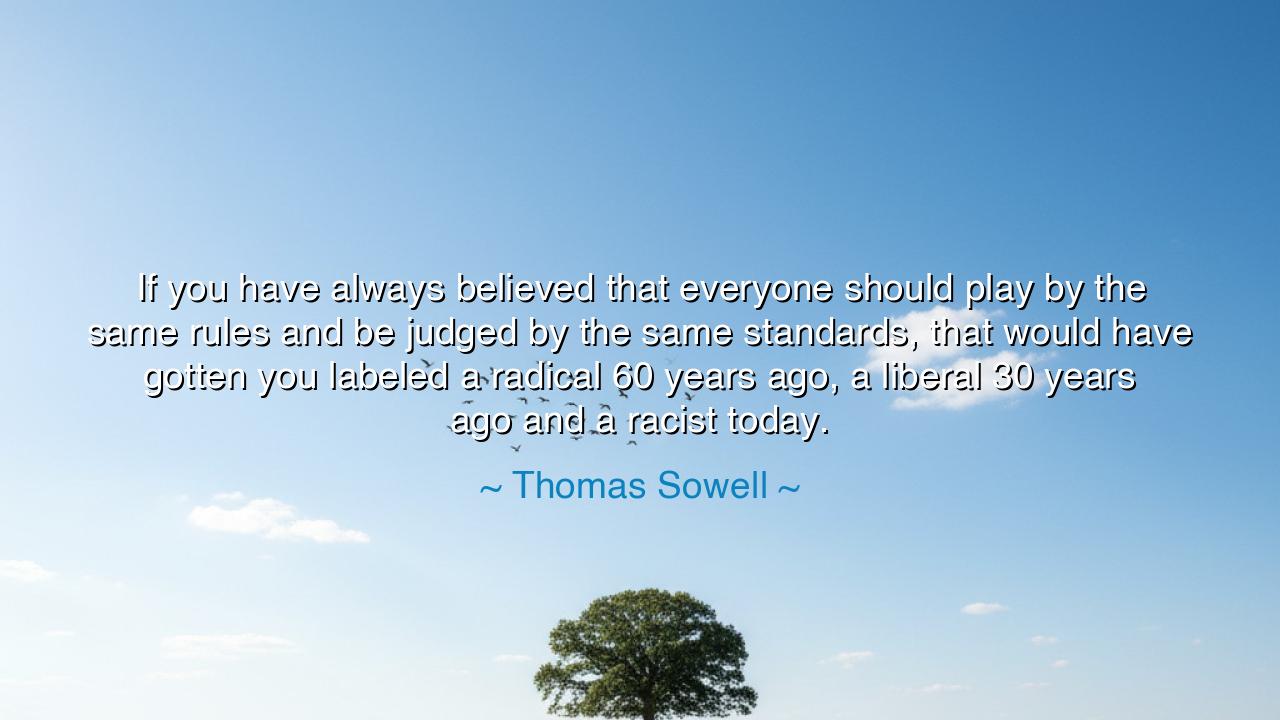
If you have always believed that everyone should play by the
If you have always believed that everyone should play by the same rules and be judged by the same standards, that would have gotten you labeled a radical 60 years ago, a liberal 30 years ago and a racist today.






The words of Thomas Sowell, “If you have always believed that everyone should play by the same rules and be judged by the same standards, that would have gotten you labeled a radical 60 years ago, a liberal 30 years ago and a racist today,” are a lament on the shifting winds of human judgment. He speaks of how ideals once seen as noble can, in different ages, be twisted into scorn, depending not on their truth but on the temper of society. Thus, the same conviction may be praised as visionary in one era and condemned as dangerous in another.
In these words lies the teaching that the world does not stand still. The names given to principles change, though the principles themselves remain. To call for equal rules and equal standards has always struck at the heart of injustice, yet what society hears in that cry depends upon its wounds, its fears, and its desires for change. What was once rebellion against segregation became progress toward equality, and now, in some places, is seen as blindness to the complexities of history and oppression.
Consider the story of Frederick Douglass, who in his day proclaimed that all men and women must be judged not by color or sex but by character and capacity. In his time, this cry was radical, an affront to the slaveholder’s order. A century later, such words inspired the civil rights movement and were seen as the voice of liberal progress. And yet, in our own time, to speak in precisely those terms may invite charges of ignoring systemic inequities, even of being complicit in them. The principle has not changed; only the world’s response to it has shifted.
Sowell’s words remind us that truth must not be abandoned simply because the world renames it. For society, like the sea, is ever-changing, its tides carrying yesterday’s virtue into tomorrow’s scorn. The wise must discern whether the change is born of deeper wisdom or of fleeting passion. To cling blindly to the labels of the age is folly; to hold fast to enduring principles, even when misunderstood, is the mark of strength.
So let this teaching be preserved: the world may call you radical, liberal, or racist, but names are but garments that change with the season. What endures is the substance of justice, the conviction that rules must be fair and standards must be true. Walk, then, with courage, knowing that society may praise you one day and condemn you the next, but the eternal measure is not the label you bear—it is the truth you serve.






ATAnh Thu
Thomas Sowell’s quote reflects a disillusionment with how ideologies evolve and shift. If the same belief system can be classified differently over time, does that suggest that no political stance is truly permanent? How do we strike a balance between upholding timeless values like equality while also adapting to the changing needs and concerns of society?
YTYen trang
This quote challenges the notion of objective standards in society. If fairness once had universal support but is now interpreted differently, how do we define what is right and wrong? Are we creating a more divided society by labeling those who seek equal treatment as problematic, or are we merely adjusting to new realities of social and political correctness?
HTTran Hong Trang
Sowell's observation suggests that societal views on equality are constantly shifting. If the same ideals were viewed as radical, liberal, and now racist, what does this tell us about the fluidity of political ideologies? How can we maintain consistent values about fairness and justice in a world where these standards seem to change so rapidly?
GH10CV2-09- Le Diep Gia Han
This quote makes me think about the complexities of social progress. If adhering to the principle of fairness and equality can lead to being labeled as something negative, what does it mean for our understanding of justice? Are we sacrificing principles of fairness in the pursuit of other social goals, or is it simply a reflection of how values evolve?
BTnguyen thi bao tram
Thomas Sowell’s quote highlights how perceptions of fairness and equality can shift drastically over time. What does this say about the evolution of societal norms and values? If what was once seen as progressive or liberal can now be viewed as racist, how do we navigate the ever-changing landscape of political correctness and social justice?